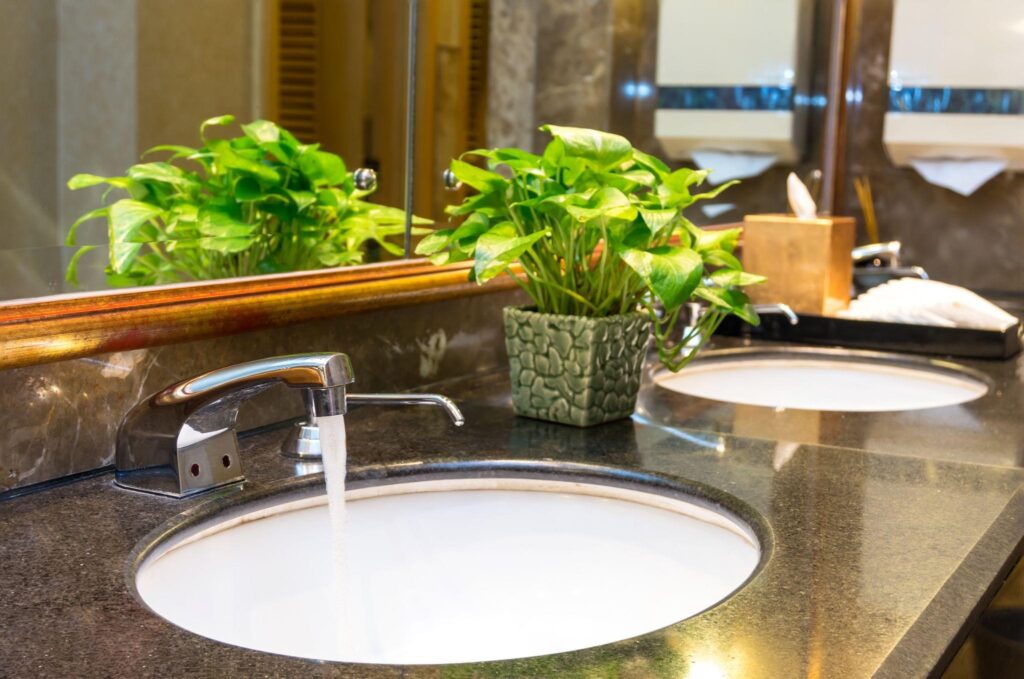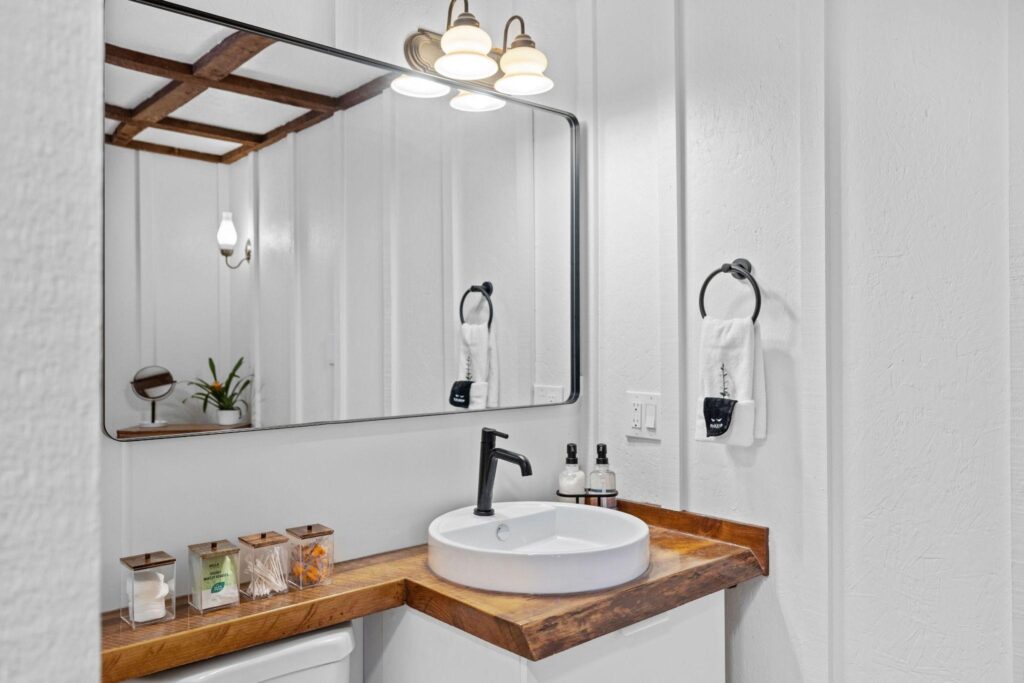Bathroom countertops enhance the functionality and aesthetics of a bathroom with their material type and designs. These countertops should be waterproof, easy to clean, and stainless to avoid water effects and soap stains. If the countertops don’t have these qualities, they will lose their aesthetics over time. Multiple countertop materials are available in the market to make your bathroom more aesthetic and functional. Be sure to choose the right type of material, like laminate countertops or marble countertops, for a flawless finish with Bath-Brite, which has a team of experts to install your bathroom countertops smoothly.
Bathroom Countertop Material With Its Pros & Cons
Do you know about the types of bathroom countertop materials? What are their pros and cons? If you don’t know, no problem. You are at the right place to get assistance regarding materials for bathroom countertops and their pros and cons, which will help you choose the best type for your bathroom.
The following are some bathroom countertop materials with their benefits and drawbacks:
Granite Bathroom Countertops
Granite is a natural stone that is available in multiple colors and designs. It offers a clear finish to your countertops and is resistant to all possible damage due to its hardness. But there is a need to install it properly to have a flawless finish.
Here are some benefits and drawbacks of granite bathroom countertops:
Pros:
- Granite countertops are highly durable and have a longer lifespan.
- It is a heat-resistant material that can handle your heated styling tools.
- It is easy to clean due to its stain-resistant qualities.
- It provides better ROI when selling your home.
Cons:
- Periodic sealing is required to maintain their water-resistance abilities.
- It is a costly material than laminate and cultured marble.
- It requires proper, careful installation due to its heavy weight.
Quartz Bathroom Countertops
These countertops are made of 70-90 percent quartz from ground and other natural materials. A variety of styles is available in these countertops. It is durable and water-resistant. They are also available with built-in sinks.
Here are some benefits and drawbacks of quartz bathroom countertops:
Pros:
- There are no chances for cracks in them.
- They are water-resistant, which enhances their functionality.
- It offers excellent resale value.
Cons:
- Quartz countertops are heat sensitive. So, you cannot put your heated styling tools on them.
- They are heavy, which requires a strong basement for their installation.
- It is an engineered stone, which is not a natural one.

Marble Bathroom Countertops
Marble bathroom countertops are made of natural stone with precise cutting and finishing. They provide enhanced and luxurious appeals to your bathroom.
Here are some benefits and drawbacks of marble bathroom countertops:
Pros:
- These countertops offer enhanced aesthetics to your bathroom.
- They can withstand high temperatures.
- More durable and reliable than many other countertop materials.
Cons:
- Their cost is higher than that of many other materials.
- They are prone to scratches from heavy or sharp objects.
- To protect from stains or etching, it should be cleaned regularly.
Laminate Bathroom Countertops
Laminate bathroom countertops are available in multiple colors and patterns in the market. It is a budget-friendly and lightweight countertop material. It is made of multiple layers of plastic that are bonded to a particleboard core. It gives it a hard finish.
Here are some benefits and drawbacks of laminate bathroom countertops:
Pros:
- It is a lightweight and budget-friendly material for countertops.
- It is available in multiple colors and patterns, which enhances the aesthetics of your bathroom.
- These countertops are easy to clean and water-resistant.
Cons:
- These countertops are not heat resistant.
- It is difficult to repair in case of any wear and tear.
- It is not a good option for luxury bathrooms.
Concrete Bathroom Countertops
Concrete is one of the most highly durable materials for countertops. It provides enhanced aesthetics with its polishing and embedding of stones, tiles, and glass particles in it.
Here are some benefits and drawbacks of concrete bathroom countertops:
Pros:
- It is naturally heat-resistant.
- It can be tailored into any look, like modern, industrial, or rustic visuals.
- It offers high durability if it is installed and maintained properly.
Cons
- It is a dense material that has a heavy weight and requires strong bases for installation.
- Its cracks are difficult to repair.
- It requires professional installation, which can cost much more.
Porcelain Countertops for Bathrooms
Porcelain is the finer type of ceramic, which is more durable and made under high temperatures with clear finishes. It is a harder and denser material, which is excellent for floors and countertops.
Here are some benefits and drawbacks of porcelain bathroom countertops:
Pros:
- They are more durable and offer longevity with daily use.
- It is highly stain and scratch-resistant.
- It is the best material for energy efficiency.
Cons:
- Sharp objects can cause chipping in these tiles.
- It can be more expensive due to professional charges to install them.
- It can give you a cold feeling during winter.

Wood Bathroom Vanity Tops
Wood bathroom vanity tops are made of natural wood. They provide natural aesthetics to your bathroom but require more care because they are not water resistant and easily susceptible to wear and tear.
Here are some benefits and drawbacks of wood bathroom countertops:
Pros:
- It offers natural aesthetic appeal to your bathroom.
- Minor scratches can be easily repaired.
- It can be painted with multiple stains to give a more prominent look.
Cons
- They are moisture sensitive. So, they require consistent care.
- Wood countertops are not heat-resistant, which makes them more prone to heat damage.
- Regular maintenance is required to keep them safe from all possible damage.
Recycled Glass Countertop
If you want multicolored and unique countertops, recycled glass countertops are the best option for you. These countertops are made from recycled or crushed glass by mixing it with concrete. It offers a unique look to your bathroom.
Here are some benefits and drawbacks of recycled glass bathroom countertops:
Pros:
- An aesthetic and visually appealing look due to its color variations.
- They can withstand hot styling tools without water damage.
- There is minimal need for their repair.
Cons:
- They are more expensive than other countertop materials, like laminate.
- If they are damaged, their repair is not an easy task.
- They have quite heavy weights.
Conclusion
To sum up, the countertops add more aesthetics to a bathroom. Multiple types of materials are available in the market for bathroom countertops, like granite, laminate, recycled glass, concrete, and wood countertops. All of these materials have their benefits and drawbacks. Choose the best material according to your bathroom architecture and budget. Be sure to consult with professionals for bathroom countertop installation.
FAQs
1: What is the function of bathroom countertops?
Bathroom countertops provide more functionality and an appealing look to your bathroom with their colors, patterns, and material types.
2: What are the solid surface countertops?
The solid surface countertops are made of man-made materials, like laminates, recycled glass, and quartz.
3: Can I get bathroom countertop installation services near me?
Yes, you can get bathroom countertop installation services near you by contacting professionals offering their services for countertop installation.
4: Which is the best material for bathroom countertops?
Granite is the best material for your bathroom countertops because it has higher durability and water-resistant abilities.
5: What is the average life of granite bathroom countertops?
The granite bathroom countertops have a lifespan of more than 50 years. They can last up to 100 years.